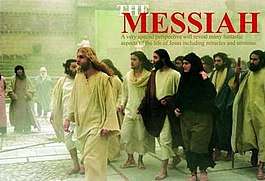The Messiah (2007 film)
Mesih (Persian: بشارت منجی), more commonly and officially referred to as The Messiah,[1][2][3][4][5] but also referred to as 'Jesus',[6] "Good Tidings of the Savior" in Persian,[7] 'Jesus, the Spirit of God',[8][9][10][11][12] 'Messia'[4] is a 2007 film from the Islamic Republic of Iran, directed by Nader Talebzadeh, depicting the life of Jesus from an Islamic perspective, based not only on the canonical gospels, but also the Qur'an, and, it would seem, the Gospel of Barnabas.[8] The latter conforms to the Islamic interpretation of the origins of Christianity. Iranian actor Ahmad Soleimani Nia plays the role of Jesus.[13][14][15] Some Islamic organizations cite it in support of the Islamic view of Jesus.[16]
| The Messiah | |
|---|---|
 The Messiah | |
| Directed by | Nader Talebzadeh |
| Produced by | Abdollah Saeedi |
| Written by | Nader Talebzadeh |
| Starring | Ahmad Soleimani Nia |
| Music by | Loris Tjeknavorian |
| Cinematography | Sadegh Mianji |
Release date |
|
| Country | Iran |
Talebzadeh said of The Passion of the Christ, "Gibson's film is a very good film. I mean that it is a well-crafted movie but the story is wrong."[1] The film has two endings, one from the Christian Bible and one from the Qur'an.
It is a two-hour-plus feature film and a TV series shot for Iranian TV.[7]
Cast
- Ahmad Soleimani Nia - Jesus
- Valiollah Momeni
- Ahmad Najafi
- Fathali Oveisi
- Morteza Zarabi - Judas
Crew
- Director of Photography: Sadegh Mianji
- Sound: Seyed Jalal Hosseini
- Set & Costume Designer: Ahmad Soleimani-Nia
- Make-up Designer: Morteza Zarrabi
- Executive Producer: Abdollah Saeedi
- Production Assistant: Saeed Kazemi
- Photographer: Saeed Sourati
- Music: Loris Tjeknavorian
Series
The movie has been adapted into a television series and shown on Iranian TV.[2] Variety stated that "With over 1,000 actors and extras, it is one of the largest film productions ever attempted in Iran.
The longer version of the film is airing as 20 45-minute episodes after a theatrical version is released here."[7] The series is being dubbed in many languages including Arabic for showing on Arab television stations.
A showing of the series based on the film by two Lebanese television stations Al-Manar and National Broadcasting Network during the Holy month of Ramadan was suspended after the broadcast of one initial episode, as the Christian religious authorities in the country demanded broadcasts to be suspended because many portrayals in the film contradict with traditional Christian church beliefs about Jesus.[17] These were scheduled broadcasts in a series adapted to television and dubbed into Arabic and shown on many Arab television stations during Ramadan.[18] The film portrays Jesus as a prophet and not as Son of God and claims he was not crucified and that someone else was crucified in his place. Talebzadeh's biopic shows Judas Iscariot being crucified instead of Jesus. Christians believe Jesus is the Son of God and thus part of the Holy Trinity and that he died by crucifixion to accomplish humanity's salvation before resurrecting and ascending to heaven.[19]
Awards and festivals
The film was played at the Philadelphia Film Festival.[15] The 2007 Religion Today Film Festival in Italy has given the movie an award for promoting interfaith understanding.[1][20]
See also
- List of Islamic films
- Saint Mary (Iranian film)
- The Kingdom of Solomon
- Iranian cinema
Notes and references
- "'Jesus' hits Iranian movie screens". Khaleej Times. AFP. 13 January 2008. Retrieved 8 February 2015.
- "ABC News: Story of Jesus Through Iranian Eyes". Abcnews.go.com. 16 February 2008. Retrieved 3 January 2012.
- "New Jesus tv series through the eyes of a Muslim director". Ibnlive.com. Retrieved 3 January 2012.
- "Nader Talebzadeh, Iranian Director". Ntalebzadeh.multiply.com. Archived from the original on 12 January 2012. Retrieved 3 January 2012.
- TheDeeZone (18 February 2008). "Jesus From a Muslim Perspective « TheDeeZone". Thedeezone.wordpress.com. Retrieved 3 January 2012.
- Iran Daily – Arts & Culture – 09/30/07 Archived 25 February 2008 at the Wayback Machine
- Young, Deborah (13 February 2005). "'Messiah' has Islamic take on Jesus – Entertainment News, Film News, Media". Variety. Retrieved 3 January 2012.
- "Bible Films Blog: ABC on ''Jesus the Spirit of God''". Biblefilms.blogspot.com. 25 February 2008. Retrieved 3 January 2012.
- "Islamic Jesus Movie: From Iran With Love! How Long Before TBN Airs It? « Jesus Christology". Healtheland.wordpress.com. 14 January 2008. Retrieved 3 January 2012.
- "'Islamic Jesus' hits Iranian movie screens". Directions to Orthodoxy. Archived from the original on 24 February 2012. Retrieved 3 January 2012.
- "'Islamic Jesus' hits Iranian movie screens". Iranian.com. Archived from the original on 11 October 2012. Retrieved 3 January 2012.
- "'Islamic Jesus' hits Iranian movie screens". Sawfnews.com. 13 January 2008. Archived from the original on 15 February 2012. Retrieved 3 January 2012.
- "Islamic Jesus hits Iranian movie screens". Directionstoorthodoxy.org. Archived from the original on 24 February 2012. Retrieved 3 January 2012.
- "Press TV – Iranian film on the life of Jesus in US". Presstv.ir. Retrieved 3 January 2012.
- ""Jesus" reflects Muslim belief in Philadelphia filmfest". tehran times. Retrieved 3 January 2012.
- W. Barnes Tatum Jesus: A Brief History 2009- Page 237 "Instead, he is taken up directly to Allah. As acknowledged by Talebzadeh, the film represents a Muslim answer to Mel Gibson's The Passion of the Christ (2004), which specialized in the brutality inflicted on Jesus even before he was nailed to .."
- "''Los Angeles Times'': Lebanon – Iranian director's Jesus film pulled". Latimesblogs.latimes.com. 16 August 2010. Retrieved 3 January 2012.
- "AFP: Lebanon bans Iranian-made biopic of Christ". Google. 13 August 2010. Retrieved 3 January 2012.
- Usher, Sebastian (13 August 2010). "''BBC News'': Lebanese Christians angered by TV show about Christ". BBC. Retrieved 3 January 2012.
- ""The Story of Jesus Through Iranian Eyes" from ABC News". Abcnews.go.com. 16 February 2008. Retrieved 3 January 2012.